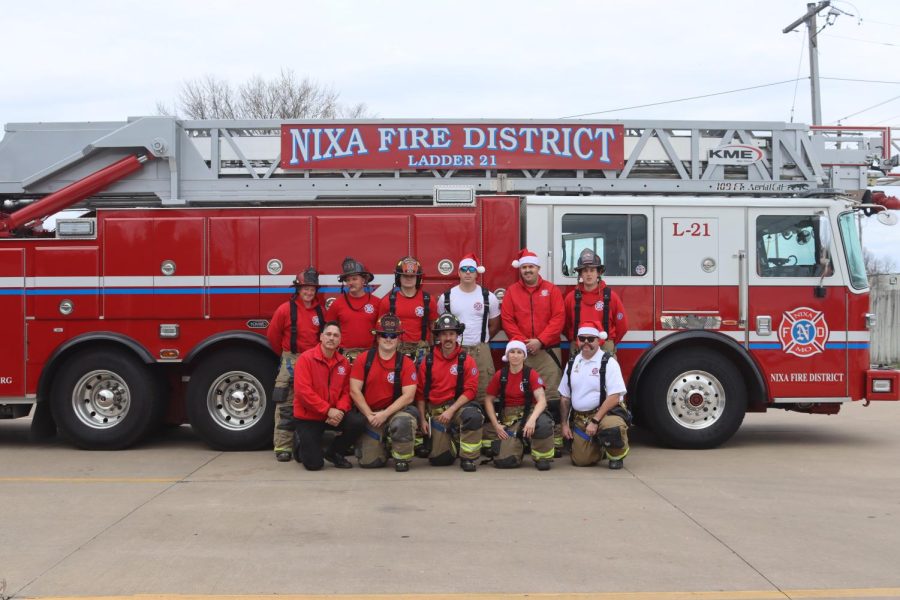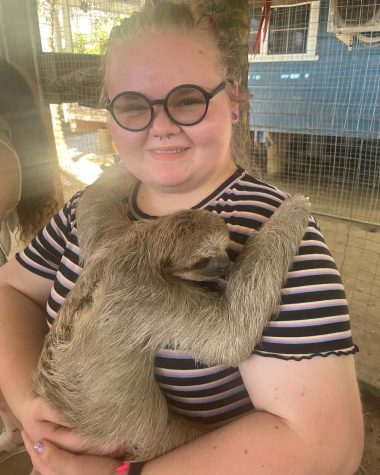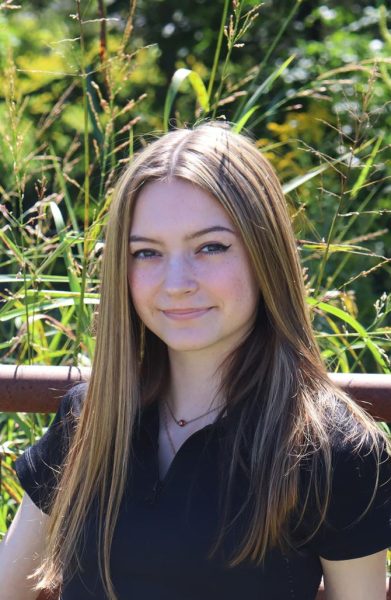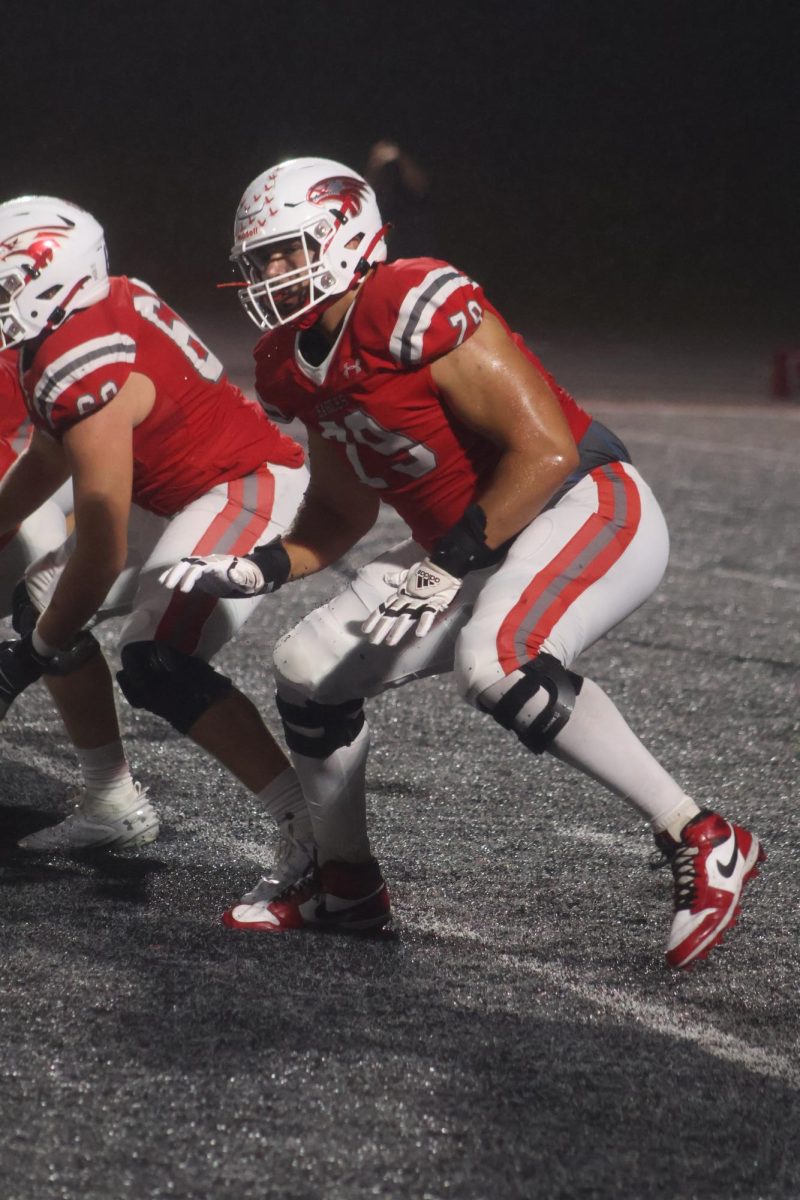Hometown Heroes
Nixa High School graduates grow up to protect their community
Nixa Fire Protection District firefighters pose in front of their ladder truck, dressed in Santa hats and their bunker gear
December 9, 2022
Being in an emergency can make one feel apprehensive and afraid. However, support from local first responders can help ease nerves and make those in need feel safe. Cory Johnson, Nixa High School graduate of 2007, grew up in Nixa and has been a firefighter at the Nixa Fire Protection District since September of 2020. He has wanted to be a firefighter since he was little.
“I wanted to become a firefighter because when I was kid, I ran my mom over with a car,” Johnson said. “It was an older car that I accidentally put into gear. She broke her pelvis and a few other bones. Then my sister jumped out of the vehicle and I smashed her against a tree. Just seeing the way the firefighters helped them and supported me at that time always stuck with me.”
While Johnson knew that he wanted to be a firefighter since he was little, Corporal Justin Henderson hasn’t always known that he wanted to be a Nixa police officer.
“I grew up not a fan of the police,” Henderson said. “I used to put myself in situations where the police would be called and I became upset when they were. A childhood friend challenged me to attend the Nixa Citizen Police Academy to see what really goes on and what these officers deal with on a regular basis. It definitely changed my life when I took a different perspective from what I thought I knew.”
A common reason why these first responders stayed in Nixa was because of the supportive community.
“I stayed in Nixa because the community is amazing,” Johnson said. “We wanted our kids to go to Nixa because we know the school district is amazing, along with the community.”
While all of these first responders wanted to stay in Nixa, firefighter Ely Caufield, 2020 graduate, was expecting to have to transfer to another department.
“Coming out of the academy, Nixa was my preferred organization to work for, but I was also prepared to accept the first job offer from any organization,” Caufield said. “Being brand new into the fire service, I wasn’t going to be picky on how I got my foot into the door. It was awesome that Nixa was my first job offer, and I accepted it before the offer was fully read to me. I was super excited and pumped up that I was getting the opportunity to work for my hometown department. Hometown pride is what made me want to stay.”
Sergeant Josh Barton of the Nixa Police Department said he has always loved the idea of helping his community.
“I’ve always wanted to be able to help people,” Barton said. “I would say the first time I decided to become a police officer was in high school. I was friends with the school resource officer at the high school and some of the Nixa police officers at that time. I did a ride-along with the Nixa officers and saw how they were able to help someone in a time of need. Also, the hours and the job looked like something I could enjoy doing for a career.”
Police officers have to learn how to handle every kind of situation. Learning about all different kinds of stressful situations requires an abundance of training.
“The training process can be a lot,” Henderson said. “Officers must deal with such a wide variety of situations and know so much that it is difficult to retain unless you really apply yourself.”
When dealing with a wide variety of situations and emotions, it is important to keep a clear head, regardless of what is happening inside and outside of the job.
“… Then, of course, there’s how you handle the situation,” Henderson said. “Sometimes even if you must deliver bad news, it’s how you speak to someone. How to talk and understand people is something I was blessed with, so that helps. I have bad days just like everyone else, but try to put myself in other people’s shoes to understand. Sometimes it turns into a situation where you must attempt to de-escalate a person or persons. If that doesn’t work, it takes someone special to be able to put themselves at risk to try to address whatever is unfolding. It can be chaotic and scary.”
There are a lot of intricacies about the firefighting job. The training process helps determine the level of dedication to the job.
“It’s a fun job,” Johnson said. “What other job do you get to play with some of the coolest tools and equipment? I would encourage anyone in high school wanting or considering becoming a firefighter to talk with the school counselor,”
Although the words “fire-fighting” are in the name of the job, firefighters do a whole lot more for the community than just fight fire.
“I believe that a common misconception about the job is that our only job is to fight fire,” Caufield said. “We do so much more. We are what’s called an ‘all hazards’ response. Virtually any problem that you might have and call 911 for, we will likely be responding to help.”
Occasionally, some people may have mixed views on the police’s intentions.
“I know when I was younger, I always thought cops were out to get me,” Henderson said. “That’s just not the case — I put myself in those situations and once I learned to take responsibility for my actions, things became much easier.”
The best part of working in Nixa where officer Barton grew up in is being able to be personable with his community.
“My favorite part about my job is going to community events and being out in the city talking to people — driving in neighborhoods and waving to everyone and speaking with them as I patrol the city,” Barton said.
In firefighting, teamwork is vital. The crew works together in almost everything they do.
“My favorite part about this job is my crew,” Caufield said. “Training with them, hanging out inside and outside of work, growing with them and building that family bond is the greatest experience of my job.”
Even while off the clock, first responders still sometimes have to respond to emergencies. Henderson recalled his most memorable experience.
“… It actually occurred just after work one day,” Henderson said. “I came home and sat down to relax when a neighbor called. They were out of town, but their two teenage daughters were home. The oldest daughter had an adverse reaction to medication she had been prescribed and collapsed. The youngest daughter called [her] mom and [the mom] called me. I flipped my phone to my wife, told her to call 911 and follow me. We ran over and into the home, their daughter was unconscious on the floor, weak pulse, with labored breathing. I was telling my wife what to tell the 911 Dispatcher when the girl stopped breathing. My experience and training helped me stay calm and begin CPR. She came out of it, and my wife took over for me. She helped to keep her conscious until medical personnel arrived. It’s difficult when you have personal attachments to keep a clear head, but that’s why the training and the knowledge you gain can be so important.”









Leesa Bumgarner • Jan 28, 2023 at 5:18 am
Beautifully written. It speaks well of your community.